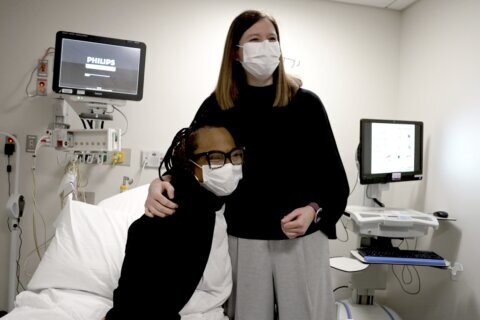Anytime you receive a new diagnosis, have a surgery coming up or get a recommendation for a major treatment plan, it’s really important to feel confident about it. If you have doubts about your diagnosis or treatment plan, or if the doctor-patient relationship doesn’t feel right, it might be time to consult with another health care provider.
Second opinion doctors can serve several purposes. They can confirm that you’re on the right course of action or bring up other treatment options that may provide better outcomes. Critically, they can also reveal a misdiagnosis or medical error that could have delayed vital treatments, led to unnecessary surgery or caused serious side effects.
“If you’re just not clicking with a health care provider you’re talking to, that’s an important signal that maybe you should seek a second opinion,” says Dr. Arif Kamal, chief patient officer for the American Cancer Society. “It’s not necessarily that the clinician is wrong, but you want to go in feeling confident that this person, for instance, has heard and understood what is important to you.”
[SEE: How to Describe Medical Symptoms to Your Doctor.]
Why Seek a Second Opinion
There are several situations when getting a second opinion can be helpful, and new doctor may have a fresh perspective and possibly a different approach to treatment that your initial health care provider didn’t consider.
“A second opinion is always an option, but the circumstances in which it is most helpful are an unclear diagnosis, a rare diagnosis or a treatment plan that carries high risk,” says Dr. Danielle Ofri, a primary care doctor at Bellevue Hospital in New York City and the author of “What Patients Say; What Doctors Hear.” No matter what the diagnosis is, if you feel uncomfortable with your medical team, you should get a second opinion. There are some other circumstances when you may consider seeking a second opinion, including if:
— You have recently received a life-changing or life-threatening diagnosis.
— You have a rare condition.
— Your treatment program isn’t working or is giving you bad side effects.
— Major surgery with potential debilitating complications is recommended.
— You are diagnosed with cancer.
— You want a surgeon who has performed a specific surgery often, with good outcomes.
— You disagree with your diagnosis or treatment plan.
— You want to explore the most up-to-date, evidence-based treatment options.
— You have a symptom, like persistent headaches, that could be caused by a variety of physical or mental health conditions.
— You want to confirm that your diagnosis is correct.
— You receive two conflicting medical opinions, and you want a third opinion for clarification.
By getting a second opinion you also gain additional information and perspective. You might learn:
— The first diagnosis was incorrect.
— There are newer, targeted therapies that are available for your condition.
— There are alternative treatments with fewer side effects.
— There are alternative options for implants and the advantages and disadvantages of each type.
— That your illness is more or less advanced than the initial diagnosis suggested.
— That your original diagnosis can be refined to better pinpoint the most effective treatment.
A 2021 study published in Mayo Clinic Proceedings concluded that getting a second opinion can reduce the rate of diagnostic errors by as much as 50%, and that a third opinion may decrease it even further. If you are still not satisfied and are looking for a third opinion, check with your insurance company before making an appointment, as some may have policies regarding multiple opinions.
[READ: Health Questions to Ask Your Doctor]
Finding a Second Opinion
If you’re wondering how to get a second opinion without a referral, here are some avenues to explore:
— Academic medical centers. Depending on the severity of your diagnosis, you might consider reaching out to well-known hospitals or medical centers. They’re often based in urban centers with renowned experts who do cutting-edge treatments, and some may participate in clinical trials that you qualify for. Some practitioners offer telehealth consults if you are not able to get to an in-person visit. You can find top-rated medical centers with experts in specialty areas such as cardiology, neurology and diabetes through the U.S. News Best Hospitals rankings.
— Consult your doctor. If you feel comfortable doing so, ask your primary care doctor for their recommendation. “Patients who seek second opinions usually want to speak to a specialist,” says Dr. Tochi Iroku-Malize, the board chair of the American Academy of Family Physicians. “Ultimately, asking for a second opinion isn’t personal, and as physicians, we regularly consult with other health care professionals ourselves.”
— Disease-specific online communities. Disease-specific websites or online communities such as patientslikeme can provide doctor recommendations for conditions such as multiple sclerosis, fibromyalgia or Parkinson’s disease.
— Insurance provider. What your insurance covers will play a big role in who you ultimately see. Make sure to contact them to find out which doctors or specialists are within your network. Confirm that the recommended doctors accept your insurance and double-check any pre-authorization requirements.
— Patient advocacy groups. Connect with patient advocacy groups related to your condition. They can often recommend specialists experienced in treating your specific health issue and can also provide support and guidance, including Facebook groups where you can seek help from other patients.
— Online research. If while researching your diagnosis you keep seeing the name of a certain doctor or hospital, it may be worthwhile to research them further. You can also look for and find patient reviews of doctors on websites, including the U.S. News doctor finder.
— Word of mouth. Personal recommendations from those you trust can be valuable. Ask family members, friends or coworkers if they can recommend a practitioner with expertise in the right field.
[Read: What to Do When Your Doctor Leaves Your Health Plan.]
How to Prepare for a Second Opinion
If you decide to pursue a second opinion, make the most of your visit by bringing or sending essential items to the doctor’s office beforehand for review. This could include any scans, biopsy reports, bloodwork, copies of your initial doctor’s notes or other pertinent information that will help you get the best diagnosis.
“When you meet with a doctor for a second opinion, it’s important that you share your medical information with them before your appointment — this includes your family history and your personal health history, as well as any medications you are taking, recent surgeries and other major changes to your health,” Iroku-Malize advises.
When getting a second opinion, it’s important to ask comprehensive questions to ensure you get the most out of your visit. Some key questions to ask:
— Do you agree with the current diagnosis or are there other possible conditions that may be causing these symptoms?
— Do you agree with the interpretation of my latest test results?
— Are there additional tests or imaging studies you would recommend?
— Do you agree with the treatment the original doctor suggested, and why or why not?
— What additional treatment options are available and what are the benefits and risks of each?
If you need surgery, meet with more than one surgeon and seek out those who specialize in your condition. If your surgery is highly specialized or complex (e.g., cardiac surgery, neurosurgery or orthopedic surgery), you’ll want to see a specialist surgeon who focuses exclusively on that type of procedure. Specialists perform their specialty procedures frequently, so their focused expertise and practice will likely lead to better outcomes.
“What should be non-negotiable is if you have cancer, you should seek the counsel of a cancer surgeon specifically,” Kamal says. “For example, for gynecological cancers like ovarian cancer, gynecological oncologists — surgeons who specialize in resecting those types of cancers — have better outcomes, including survival, than, let’s say, a general surgeon.”
It’s important to ask the surgeons you meet with specific questions to ensure you understand and are comfortable with their approach, success rate and bedside manner. Take detailed notes during your visit so you can compare the responses of each. Here are some key questions to consider asking:
— How many times have you performed this surgery and what is your success rate?
— Are there any complications you’ve encountered with this surgery and how often do they occur?
— Who will assist you during the surgery?
— What should I expect after the surgery and how available are you for any post-op questions or follow-up visits?
Having a high degree of confidence in your doctor, diagnosis and treatment plan is critical when you’re facing a difficult medical situation. Finding a specialist and asking the right questions helps patients to make well-informed decisions about their healthcare path.
Bottom Line
Patients should consider a second opinion when facing a serious health condition, are contemplating surgery or feel unsatisfied with their current care. A second medical expert can validate an initial diagnosis and treatment plan or offer alternative perspectives, potentially leading to a more accurate diagnosis and more targeted treatment options.
More from U.S. News
Veteran Benefits for Assisted Living: What You Need to Know
When to Get a Second Opinion originally appeared on usnews.com









